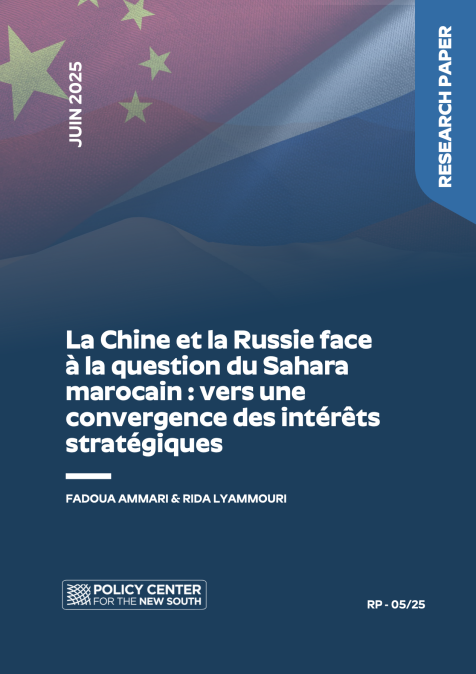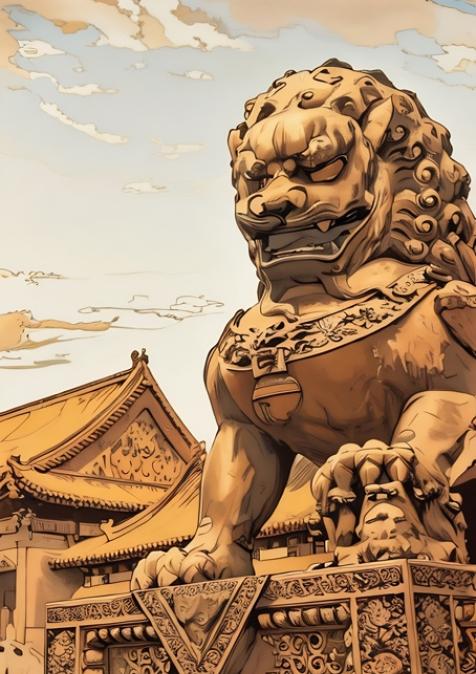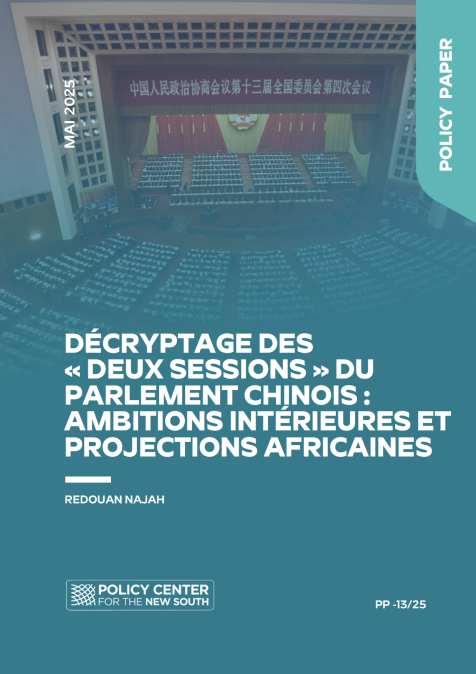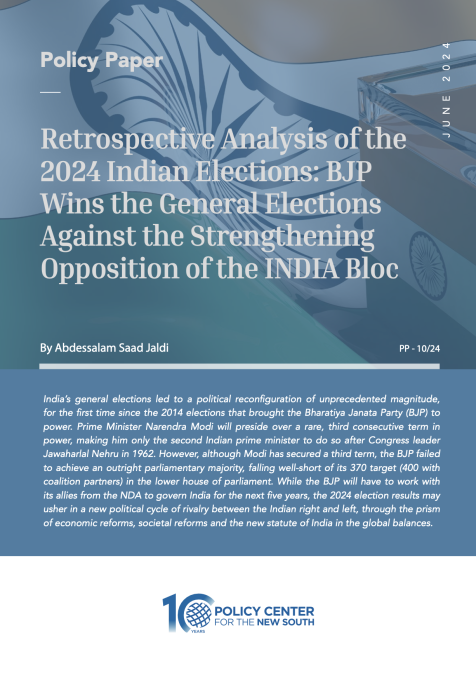Publications /
Opinion
The role played by diasporas in international relations should not be neglected. Bilateral engagements between states can be significantly affected by the practical and perspective relations between the diaspora community and their homeland. In the African context, none has been so deeply incorporated into the economic and social fabric of the continent as the Indian diaspora. Historically symbolized by Gandhi’s emblematic sojourn in South Africa and the participation of Indian indentured laborers in the construction of the Kenya-Uganda railway in East Africa, the Indian diaspora has long been an integral part of all facets of development in many African countries. In 1950, then Indian Prime Minister Jawaharlal Nehru still advocated the integration of the Indian diaspora in African states. However, after the end of the Cold War, the role of the diaspora within Indian foreign policy was fundamentally reassessed. Recently, India intensified efforts to revamp its relations with Africa, in particular through the Indian diaspora, after decades of neglect. How can Indian diaspora in Africa for the benefit of New Delhi’s Policy?
The geographical spread of the Indian diaspora in Africa
The Indian diaspora in Africa is estimated to encompass 3 million people spread across the continent. According to the New Delhi authorities, the Indian diaspora refers to those who migrated from territories that are currently within the border of the Republic of India and their descendants. Pan-Indianists, however, sometimes expand this geographical context by also including those who migrated from Pakistan, Bangladesh and Sri Lanka. The UN Development Program affirms that the Indian diaspora comes second only to that of China in terms of numbers.
The Indian diaspora consists of two different groups of people, so-called Non-Resident Indians (NRIs) and Persons of Indian Origin (PIOs). The NRIs are Indian citizens who have emigrated. The PIOs, on the other hand, have Indian ancestors, but they have taken the citizenship of their new home country and are therefore not Indian citizens. This definition seems suitable for describing the Indian community in Africa: its members preserve a sense of cultural identity manifested in their religious festivals and beliefs, as well as in their group distinctiveness, and many still have kinship ties with other scattered members of their group in Africa. Further, they retain a sense of India’s role in their present identity though there is no apparent desire on their part to return to India. The largest concentrations of the Indian diaspora in Africa are found in South Africa (1.5 million), Mauritius (855,000), Reunion (220,000), Kenya (100,000), Tanzania (100,000), and Uganda (90,000). Particularly in the islands of the Indian Ocean, the diaspora accounts for a large proportion of the total population. In Mauritius, the proportion of the population of Indian descent is over 60%, in Reunion 31% and in Seychelles around 6%. However, in the African territorial states, the highest share is only 2.5% in South Africa; the share is much lower in Botswana (0.66%), Kenya (0.30%), Tanzania (0.28%), Mozambique (0.13%) and Zimbabwe (0.01%)[1].
The Role of the Diaspora in the African Policy of New Delhi
In keeping with the current realities of globalisation, India’s African policy paradigm is essentially economic. South Africa, host to the largest Indian diaspora in Africa possesses abundant quantities of gold, diamonds and other minerals. Botswana, a country which is home to a number of Indian immigrants, also possesses diamonds. In East Africa, Uganda has already started producing oil and Tanzania is known to be rich in several minerals. Other African countries, which may not have a significant number of Indian immigrants but possess minerals and other raw materials needed by India, include Nigeria, Angola and the Democratic Republic of Congo. On the other hand, from 2002 to 2012, around $64 billion in investment flowed from Africa to India. Surprisingly, Mauritius, a small African country, is the world’s largest direct investor in India: 99% of all African investments in India were Mauritian. This peculiarity is essentially due to Mauritius’s advantageous tax legislation, and more importantly, the large Indian section of its population. To save taxes, foreign companies, and Indian companies whose owners are NRIs and PIOs, use Mauritius as a starting point for their investments in India. This is why the island state composed of 60% of PIOs has now replaced Singapore as the most attractive place for Indian foreign investment. Indian companies invest in Africa via Mauritius; in official statistics, these funds are then listed as direct investments from Mauritius. The small country therefore plays a similar role for New Delhi as Hong Kong does for Beijing.
This is why New Delhi is rethinking its attitude towards its diaspora in Africa. People of Indian descent in Africa are in a position to help India improve its African policy in the various countries where they hold citizenship. Indeed, they have knowledge of local business conditions and customs, and many of them are successful businesspeople themselves. Mayur Madhvani, a Ugandan businessman, entrepreneur, and industrialist of Indian origin, defended the idea that India should take advantage of its large diaspora in Africa because of the advantages it provides for Indian business. For example, the NAKUMAT Supermarket Chain in the African Great Lakes countries, owned by the Atul Shah family, had gross annual revenues in excess of $450 million. A part from business, there are professionals of Indian origin in virtually every African country. They also hold important decision-making positions in government and administration[2]. (e.g Fatima Meer, Ahmed Kathrada, Amina Cachalia, Sisupal Rambharos, Billy Nair, Pravin Gordhan and TP Naidoo in South Africa; Aniroot Jugnath and Navinchandra Ramgoolam in Mauritius; Manilal Premchand Chandara, Ramedios Santana De Souza and Pheroze Nowrojee in Kenya; Rajini Kanabarand JK Chande in Tanzania; V Ramadoss in Seychelles and Moosa Ebrahim in Zimbabwe). The Indian diaspora can therefore play an influential role in enhancing investment, accelerating industrial development, boosting trade and improving political relations. Simultaneously, African countries are also looking to India as a partner to help them grow and develop, and they too can utilise in this effort the Indian diaspora, which represents a potent source of skilled labor and expertise in their home nations. This is already happening as illustrated by the appointment of Nimisha Madhvani, who is of Indian origin, as Uganda’s High Commissioner to India. Such actions can help foster goodwill and a better understanding between the continent and India, especially in the context of the COVID-19 pandemic.
One of the first efforts in this direction was the creation of India’s Ministry of Overseas Indian Affairs, very much along the lines of China’s Ministry of Overseas Chinese Affairs. The goal of this ministry is to build a partnership with the Indian diaspora, anchoring all diasporic initiatives in the state of India. The ministry began to sponsor the celebratory day of Pravasi Bharat Divas in 2003 to mark, in its words “the contribution of the Overseas Indian community in the development of India”. Moreover, many Indio-Africans have been recognized through these awards. In 2006, the government of India also introduced the Overseas Citizenship of India (OCI) program, which facilitated a limited form of dual citizenship for NRIs and PIOs. During the 2010 Pravasi Bharat Divas Africa in Durban, South Africa, India was quite candid about its current objectives which, it stated, was to engage primarily with the “Indian diaspora and other interested parties in South Africa and the continent of Africa with a view to fostering mutually beneficial relations between India and Africa in business, culture, politics and sustainable development”[3]. The moment was expected to improve understanding, and close relations between the Indian diaspora, and this is certainly important in the effort to boost the African policy of New Delhi.
When Narendra Modi took office in 2014, he intensified the efforts towards the Indian diaspora in Africa. In 2015 during the third India-Africa Summit in New Delhi, the Indian authorities emphasized the desire to open 18 new embassies in Africa by 2021, in order to further strengthen the links with the diaspora. As part of his visit to Uganda in the summer of 2018, PM Modi gave a speech aimed to the Indian diaspora in Kampala.
The Contestation of the Idea of the Indian Diaspora in Africa
The idea of an Indian diaspora in Africa is contested by some influential PIOs. For example, Fatima Meer, a well-respected South-African anti-apartheid activist, during a convention of experts from the Indian diaspora, convened by the Indian government in 2006, strongly criticized the idea that Indians in South Africa belonged to a larger Indian/South Asian diaspora. According to her, Indians in South Africa have fought too hard and too long to be recognized as South African citizens and therefore could not risk that secure citizenship by emphasizing or highlighting the Indian part of their identity. There are many like her, particularly in countries where Indians are fewer in number, and their African identity is often challenged by the local population because they choose to keep their Indian cultural identity intact.
Some Indian personalities say that the Indian government is not doing enough to engage with its African diaspora, while it is reaching out to its diaspora in the west in a much bigger way. According to Nimisha Madhvani, the Ugandan High Commissioner to India, “The Indian government has not really focused on Indians in Africa which is why many of the big Indian origin in that continent do not look at putting their money in India but instead tap business opportunities in Europe and America”[4]. Another relevant example is the Chinese diaspora, which still contributes 70% of all inward FDI into China, and attracts comparison because of the enormous contribution it has made to China’s economic development. At the same time, India may need to attract foreign investment to create jobs and other opportunities for its large population and the Indian diaspora in Africa could be encouraged to invest in India. This would require the creation of an enabling environment by the authorities in New Delhi, specifically targeting the diaspora.
Conclusion
The Indian diaspora in Africa is very special since it has contributed its skills to the development of the country of adoption, and is integrated with local people. Furthermore, it has been seen that the Indian government is no longer ignorant of the successes and activities of the PIO’s, as they have retained their emotional, cultural, and spiritual links with New Delhi. Thus, we see how significant the role and contribution of the Indian diaspora is in the African policy of India.
The opinions expressed in this article belong to the author.
[1] Christian Wagner. India’s Africa Policy. German Institute for International and Security Affairs. July 2019. Page 13.
[2] e.g Fatima Meer, Ahmed Kathrada, Amina Cachalia, Sisupal Rambharos, Billy Nair, Pravin Gordhan and TP Naidoo in South Africa; Aniroot Jugnath and Navinchandra Ramgoolam in Mauritius; Manilal Premchand Chandara, Ramedios Santana De Souza and Pheroze Nowrojee in Kenya; Rajini Kanabarand JK Chande in Tanzania; V Ramadoss in Seychelles and Moosa Ebrahim in Zimbabwe.
[3] Ruchita Beri. India and Africa: Enhancing Mutual Engagement. Institute for Defense studies and analyses. 2014. Page 142.
[4] Ishani Duttagupta. Vying for Africa : India needs to tap its diaspora to match China. https://economictimes.indiatimes.com/special-report/vying-for-africa-india-needs-to-tap-its-diaspora-to-match-china/articleshow/5518942.cms?from=mdr








